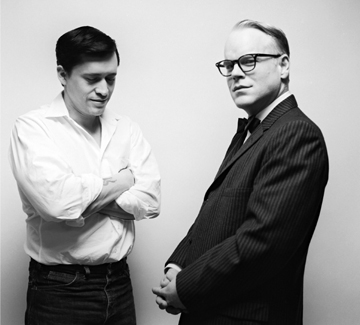 Clifton Collins Jr. and Philip Seymour Hoffman try to use each other in ‘Capote.’
Clifton Collins Jr. and Philip Seymour Hoffman try to use each other in ‘Capote.’
|
| Capote\r\nStarring Philip Seymour Hoffman and Clifton Collins Jr. Directed by Bennett Miller. Written by Dan Futterman, based on Gerald Clarke’s biography. Rated R. Opens Friday at Modern Art Museum of Fort Worth, Nov. 4 at UA Hulen. |
|
A D V E R T I S E M E N T
|
|
|
|
A D V E R T I S E M E N T
|
|
I Know This Much Is Tru
Philip Seymour Hoffman \r\nmakes Capote’s dark side \r\nshine through.
By KRISTIAN LIN
Moon-faced, sandy-haired, and gifted with a deep rumble of a voice, Philip Seymour Hoffman has burned his way into our moviegoing consciousness through his high-intensity performances in supporting roles. Who could forget him as the kindly nurse in Magnolia, the rich snob in The Talented Mr. Ripley, the gay stagehand in Boogie Nights (“I’m such a fucking idiot!”), the psychotic mattress-store owner in Punch-Drunk Love, the dorky screenwriter in State and Main, the debauched preacher in Cold Mountain, or any other of a dozen small to medium-sized parts? Hell, even on the rare occasions he’s in a total piece of crap like Along Came Polly, he managed to waltz off with the picture.
Curiously, his track record in lead roles hasn’t been nearly as golden. Despite his outsized talent, it was starting to look like he’d never imitate fellow character actor Paul Giamatti and show that he could carry a movie. Hoffman gave a one-dimensional performance as a widower falling apart and then falling apart some more in Love Liza. You could have written off his participation in that film because his brother wrote the script, but no such excuse was available for the equally monochrome Owning Mahowny, which found him in stubbornly uncommunicative form as a straitlaced Canadian banker consumed by his casino gambling addiction.
Now, he has finally found a starring role worthy of him in Capote, and he delivers a career-making performance. Of course, Truman Capote’s fey mannerisms and falsetto voice were well-known through his appearances on tv talk shows. Even now, 20 years after his death, he still inspires impressionists. Within the first two minutes of seeing Hoffman here, you can tell he has all of Capote’s tics down; the trick is holding our attention after that.
The film begins in 1959 as Truman learns of an entire family in Kansas being murdered by two would-be robbers. Bent on changing his lightweight literary reputation established by such books as Breakfast at Tiffany’s, he spends the next six years researching and writing the book that will become In Cold Blood. Director Bennett Miller can’t resist the image early in the film of the Kansas sheriff (Chris Cooper) giving a press conference to a bunch of sober midwesterners wearing suits in shades of black and gray, into which Truman sashays with a Bergdorf Goodman scarf wrapped around his neck.
The movie also represents a huge creative breakthrough for Miller, a documentarian showing a deft touch in his first fiction film, and Dan Futterman, an actor from tv’s Judging Amy who has turned in a knife-edged script in his first screenwriting effort. Their film doesn’t tell us what to think the way Hollywood biopics do. Instead, the filmmakers pitilessly show us Truman coldly manipulating everyone to get his story, especially Perry Smith (Clifton Collins Jr.), one of the murderers. Truman lies to Perry, telling him he wants to write a sympathetic profile, and appeals to Perry as a product of a similarly broken home. He even helps Perry’s appeal process but then is devastated when Perry looks like he might actually win — if the killers aren’t executed, there’s no book. Where Good Night, and Good Luck gives us the journalist as crusading hero, Capote gives us the non-fiction writer as vampire.
If Miller and Futterman’s treatment of this story has one tiny shortcoming, it’s that they could have stood to be a little fizzier, between the New York high-society milieu that Capote made into his home and the fact that the man himself could be terribly witty. A few stray bits of humor might have made this film less austere. Still, you can’t deny the muscular strength of the filmmakers’ rigorous approach, nor their grasp of the complex ethical issues swirling around Truman as he ruthlessly exploits the killers and victims alike, even while he turns their plight into a remarkable book. (The script gives us just enough of Capote’s prose, with its eye for phantasmagoric detail and inexorable tragedy, to make us appreciate the man’s talent.)
For his part, Hoffman draws us into the mind of this man who could be lethally charming or simply lethal. His Truman is monstrously petty and self-absorbed, neglecting his boyfriend (Bruce Greenwood) and wrapping himself in alcoholic bitterness when his research assistant Harper Lee (Catherine Keener) publishes To Kill a Mockingbird and suddenly becomes more famous than him. Hoffman’s most remarkable work comes near the end of the film, when Truman speaks to the killers shortly before their execution and then witnesses their deaths by hanging. Choked with terror, he’s like a man standing on a precipice in these quiet, awful scenes. As much as Truman uses people, he’s the one who’s destroyed in the end, even as his book meets with glowing success. Driven to extremes by his literary ambition, he can neither bear to return to the dark realms of In Cold Blood nor go back to writing light fiction. As the film tells us, Capote never finished another story after this. Hoffman lets us see the weaknesses and limitations in this vastly talented writer and makes this hard and unsympathetic man into a figure of powerful tragedy.
 Email this Article...
Email this Article...

